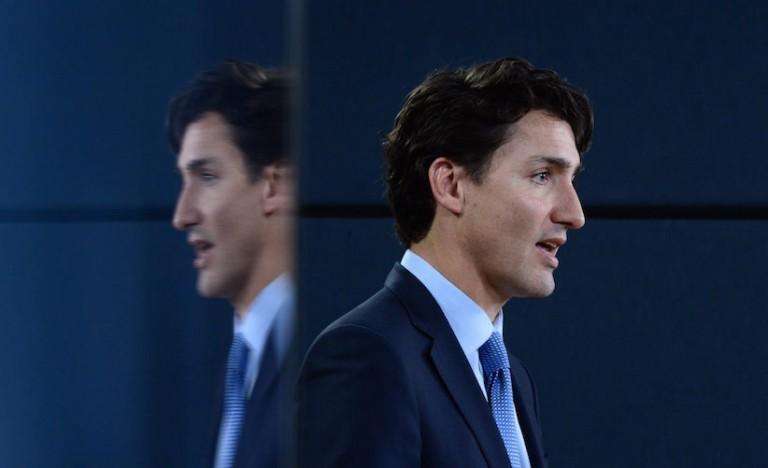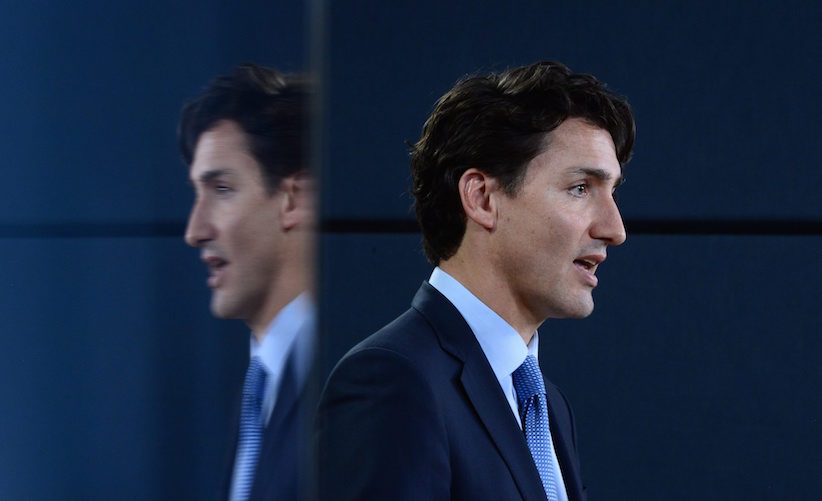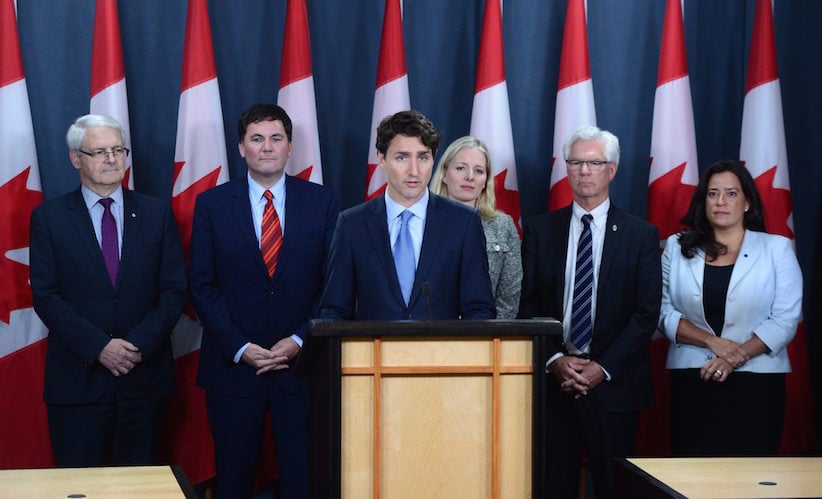Trudeau crunches the crude math of pipeline politics
Evan Solomon on Justin Trudeau’s tough political calculus on Trans Mountain, and the real reason he approved it

Prime Minister Justin Trudeau holds a press conference at the National Press Theatre in Ottawa on Tuesday, Nov. 29, 2016. Trudeau is approving Kinder Morgan’s proposal to triple the capacity of its Trans Mountain pipeline from Alberta to Burnaby, B.C. — a $6.8-billion project that has sparked protests by climate change activists from coast to coast. THE CANADIAN PRESS/Sean Kilpatrick
Share

The day before Justin Trudeau announced the government’s decisions on three major pipelines—yes to the $6.8-billion Kinder Morgan Trans Mountain pipeline expansion, yes to the $7.5-billion Enbridge Line 3 replacement pipeline, and no to Northern Gateway—I called Grand Chief Stewart Phillip of the Union of British Columbia Indian Chiefs to gauge the coming resistance. The Grand Chief had perfectly predicted the government’s verdict and talked as if the fight had already started. “This will intensify the deeply entrenched opposition, and there will be legal and political action and also action on the ground,” he said matter-of factly, as if “betrayal” from the federal government—and that’s how he described it—was as predictable as the Coastal rains.
What caught me off guard though, was how personal his anger was for Justin Trudeau.
“Trudeau lied to us,” the Grand Chief said, tearing into the exact explanations that the prime minister would give 24 hours later as if he had read the PM’s talking points about the enhanced National Energy Board process, the $1.5-billion ocean protection plan, and the promise of more consultation. “It’s all another sleazy, pathetic, lame public relations act on the part of Trudeau to appear that he is taking a balanced approach when that is not the case.”
Lied. Sleazy. Pathetic. These are not words Trudeau wanted to hear after he wrote in the mandate letters to his ministers that “no relationship is more important to me and to Canada than the one with Indigenous Peoples.” That may still be true, but pipeline politics have a way of wrecking relationships.
The prime minister is keenly aware of this, and during his announcement he acknowledged how divisive his decisions are, especially his approval of the Trans Mountain pipeline which, for Trudeau, will be what the Keystone XL pipeline was for Stephen Harper: a defining fight. Trudeau knows that First Nations leaders, political figures like Vancouver mayor Gregor Robertson and even two of his own B.C. MPs, Ron McKinnon and Terry Beech, are passionately opposed to Kinder Morgan. He knows their political futures might depend on this fight. (Grand Chief Phillip told me this could pipeline “cost Trudeau the entire province.” ) Trudeau even knows this could be the very issue that jolts the moribund NDP back to life, as they rally around what they view as Trudeau’s Great Green Betrayal. Green Party Leader Elizabeth May has vowed to go to jail to stop the pipeline. And she has pull in British Columbia.
So why, given the heavy costs, did Trudeau do it? To save Alberta Premier Rachel Notley.
Well, the crude math of pipelines is a little more complicated. It’s not Rachel Notley herself Trudeau wants to save, but his own climate strategy. But as he fully knows, the Liberals’ national climate plan—the price on carbon, phasing out coal-fired electricity plants—depends on support from Alberta. Trudeau cannot afford to look like he is imposing some green plan from Eastern Canada at the expense of jobs in the West without resurrecting the ghosts of his father’s National Energy Plan—that could alienate the West for another generation—and so Alberta gives the Liberals cover. And Notley can’t survive as premier of Alberta, committed to her own ambitious climate plan, unless the federal government comes to her aid with some pipelines and economic growth. If Trudeau had said no to Kinder Morgan, Notley would have little chance against the gathering storm of a united conservative party under Jason Kenney, who would rip apart her environmental legacy.
For Trudeau, this was as much a decision on pipelines as it was political life insurance—and now he and Notley are locked in a kind of mutually assured survival.

As Trudeau made his announcement, five of his ministers stood behind him for support: the transportation minister, the fisheries and oceans minister, the environment minister, the natural resources minister, and the justice minister. That doesn’t just signal a whole of government approach; that’s a posse ready for a fight. But the most important player in all this was missing: Finance Minister Bill Morneau. If the Liberals’ green agenda was one half of the political calculus behind the decision, the other half was their growth agenda. Morneau is hemorrhaging money on Liberal promises and he desperately needs growth. The Liberals know that getting natural resources to tidewater means jobs and growth, even if it also means they lose their idealistic sheen. That’s the thing about Liberals: idealism never gets in the way of pragmatism.
So, a pipeline for a carbon price. That is the crude math. The pipeline decision covers Notley’s flank while protecting their own long-term environmental plan. The bet is that the 157 binding NEB conditions, and the predictable years of litigation ahead, will move into a grinding process that will mute the acute political damage.
Meanwhile, Trudeau plans to work his consultation wizardry and rebuild alliances. It’s no coincidence that the day he announced the pipelines, he also announced a meeting with First Nations leaders in early December. I don’t know if raw charm can be transported through pipelines, but Trudeau is going to give it a go. Don’t bet on it working. The chances are low that Trudeau will be able to mollify his harshest critics by arguing—as he did—that the transition to a carbon-free economy requires two new oil pipelines. They regard his rationale as a political oxymoron on par with the infamous Vietnam War quote, “we had to destroy the village to save the village.”
Eugene Kung, staff council at West Coast Environmental Law, told me this could be the prime minister’s Clayoquot Sound, referring to the major protest against the logging of old growth forest on Vancouver Island in the late 1980s and 1990s. At the time, people blockaded logging roads and chained themselves to trees, with hundreds of people getting arrested in what was a galvanizing moment for environmentalists around the world. ”There will be an onslaught of litigation from First Nations, Municipalities, ENGOs and Unions,” Kung said about the fight to stop Trans Mountain. “The political costs will be much broader than just trading some seats between B.C. and Alberta. The cost to Trudeau’s reputation and legacy will be greater, in terms of being a climate leader and setting a new path with First Nations. Climate leaders don’t build pipelines.”
Does Trudeau get a pass for saying no to Northern Gateway? Not according to Grand Chief Phillips. “We went to the funeral for that pipeline a long time ago, so that’s no surprise,” he said. In fact, if anything, the scuttling of Northern Gateway may only inspire a fiercer fight against Kinder Morgan. “Northern Gateway and the Tanker Ban are proof that First Nations, backed by local communities, can stand up to Big Oil,” says Kung. “The spill plan is a welcome improvement, but is still a far cry from being anywhere near adequate or effective.” The terrible response to the recent diesel fuel spill from a tugboat off the coast of B.C. near Bella Bella made a mockery of any claim of a world-class response system. “None of the conditions or spill response plan will make bitumen float,” Kung says. As for the NEB changes, those too don’t impress Kung. “The NEB conditions are toothless, and are mostly just planning conditions. As the auditor-general found last year, the NEB is struggling to track, let alone enforce, their weak conditions.”
Still, with all that, the Liberals have gone ahead. The risks are enormous, but Trudeau has made a straight calculation: economic growth and his national climate plan in exchange for angry First Nations, betrayed environmentalists and fewer seats in B.C. The Kinder Morgan pipeline is years away from being built, but the political costs are being calculated right now. Some call all this cynicism. But in Ottawa, there is a more prosaic term: governing.